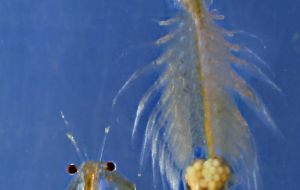MercoPress. South Atlantic News Agency
Australia Opens Brine Shrimp Farm, Key Component in Aquaculture Food Chain
 Brine-shrimp, also known as Artemia or ‘sea monkeys’
Brine-shrimp, also known as Artemia or ‘sea monkeys’ Australian Fisheries Minister Norman Moore embraced the aquaculture potential of Western Australia with the opening of a cutting edge-design commercial brine shrimp farm at Port Gregory, near Geraldton.
Brine shrimp, also known as Artemia or ‘sea monkeys’ are a key component of the food used in the commercial aquaculture of fish and prawns.
Norman Moore said an expert team led by Department of Fisheries’ scientist Sagiv Kolkovski, had developed the technologically-advanced facility to cultivate the minute Artemia, in partnership with Cognis Australia, the world’s biggest producer of the naturally occurring red pigment, beta-carotene. The farm is located at Cognis Australia’s Hutt Lagoon, Port Gregory plant, where the company farms micro-algae from which beta-carotene is extracted.
“This new facility has potential to create a new multi-million dollar industry in rural Western Australia and will help lead to more sustainable fish farming practices both domestically and internationally,” Moore said. “The development of this project marks the culmination of seven years’ research work, providing a much-needed source of high quality, sustainable fish-feed for Australian and international fish-farms [...] The project embodies the State Government’s goal of promoting sustainable fishing and aquaculture practices and ensuring there are fish for future generations.”
The development is collaboration between the State Government, the aquaculture industry and the Fisheries Research and Development Corporation (FRDC).
Artemia, commonly known as ‘sea monkeys’, feed on micro-algae. They can be an unwanted pest in the production of beta-carotene. However, researchers have devised an Artemia-rearing system that can work effectively in tandem with Cognis’ large-scale commercial micro-algae plant, turning a potential threat into an opportunity.
Because it feeds on the highly nutritious algae, the Artemia produced will be of the highest-grade quality and contribute to the reduction of the reliance on imported Artemia supplies and other less sustainable fish feed sources, answering one of the main criticisms levelled at the industry. Artemia produced at the plant will also help fill the regular gaps in Artemia supply to Australia’s commercial aquaculture industry as a result of market shortfall.




Top Comments
Disclaimer & comment rulesCommenting for this story is now closed.
If you have a Facebook account, become a fan and comment on our Facebook Page!